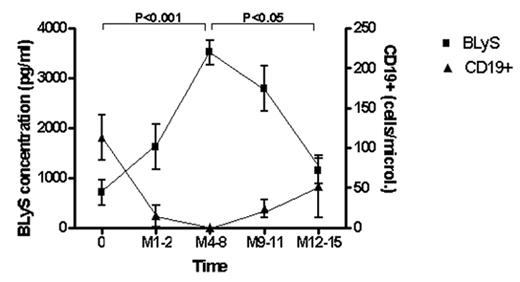Abstract
The study aim was to examine the B-Lymphocytes Stimulator (BLyS) receptor-ligand system in HCV induced B lymphocyte clonal disorders. 94 patients with chronic HCV [including 35 HCV+ mixed cryoglobulinemia (MC)-vasculitis and 9 HCV+ B-non Hodgkin’s lymphoma (B-NHL) patients] and 15 healthy volunteers were included. A 2-fold serum BLyS increase was associated with HCV-induced MC-vasculitis, and a three-fold increase with HCV-induced B-NHL, compared with HCV+ patients without vasculitis or healthy controls (p<0.05). Lower mBLyS expression in HCV-induced MC vasculitis was observed. CD19+ BLyS binding and BR3 staining showed a step wise decrease with highest values in healthy controls and HCV+ without MC, and lowest in B-NHL (p<0.05, p<0.0001, respectively) with a further decrease in Vh1-69+ (heavy chain rearrangement often found in clonal disorders associated with HCV) clonal B-cells. BLyS anti-apoptotic effects were maintained despite this decrease in BR3 staining. Complete clinical remission after anti-viral treatment was associated with a decrease in serum BLyS, and an increase in BR3 staining. Rituximab treatment was associated with a five-fold increase in serum BLyS (p<0.001), mirroring the depletion of CD19+ cells. BR3 staining in repopulating B-cells was significantly decreased (p<0.005). In conclusion, the BLyS ligand-receptor activity is increased in HCV induced B-cell clonal disorders, indicating a possible role for treatment targeting the BLyS receptor-ligand system.
Author notes
Disclosure: No relevant conflicts of interest to declare.



This feature is available to Subscribers Only
Sign In or Create an Account Close Modal